2020年12月英语四级翻译练习题及解析:中国成语
2020年12月四级翻译真题答案及解析
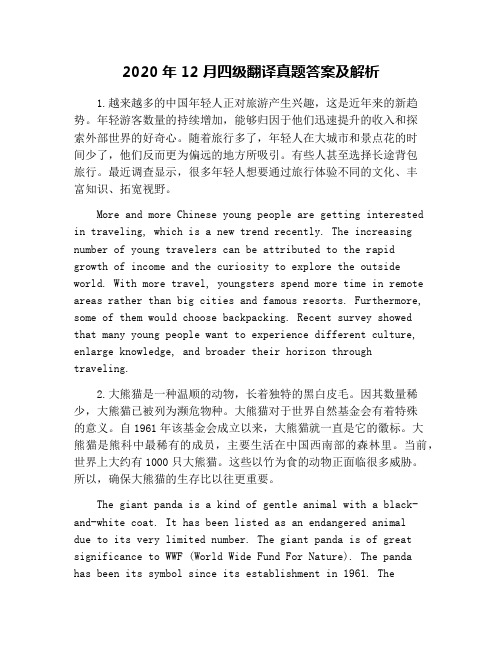
2020年12月四级翻译真题答案及解析1.越来越多的中国年轻人正对旅游产生兴趣,这是近年来的新趋势。
年轻游客数量的持续增加,能够归因于他们迅速提升的收入和探索外部世界的好奇心。
随着旅行多了,年轻人在大城市和景点花的时间少了,他们反而更为偏远的地方所吸引。
有些人甚至选择长途背包旅行。
最近调查显示,很多年轻人想要通过旅行体验不同的文化、丰富知识、拓宽视野。
More and more Chinese young people are getting interested in traveling, which is a new trend recently. The increasing number of young travelers can be attributed to the rapid growth of income and the curiosity to explore the outside world. With more travel, youngsters spend more time in remote areas rather than big cities and famous resorts. Furthermore, some of them would choose backpacking. Recent survey showed that many young people want to experience different culture, enlarge knowledge, and broader their horizon throughtraveling.2.大熊猫是一种温顺的动物,长着独特的黑白皮毛。
因其数量稀少,大熊猫已被列为濒危物种。
大熊猫对于世界自然基金会有着特殊的意义。
自1961年该基金会成立以来,大熊猫就一直是它的徽标。
大熊猫是熊科中最稀有的成员,主要生活在中国西南部的森林里。
2020年12月英语四级翻译真题及答案(完整范文).docx
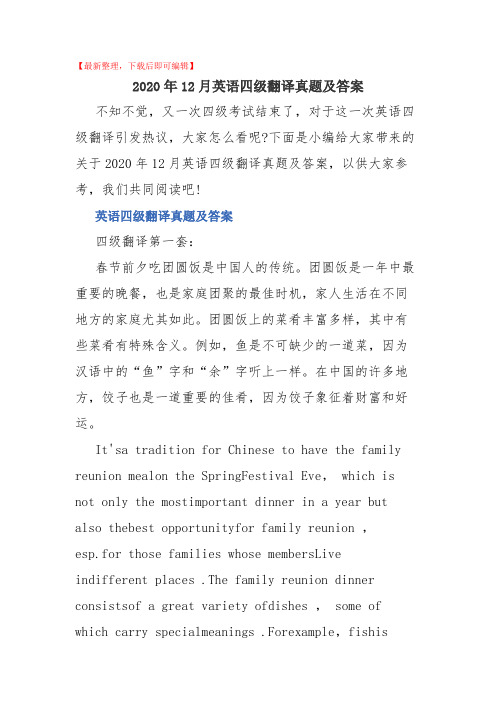
【最新整理,下载后即可编辑】2020年12月英语四级翻译真题及答案不知不觉,又一次四级考试结束了,对于这一次英语四级翻译引发热议,大家怎么看呢?下面是小编给大家带来的关于2020年12月英语四级翻译真题及答案,以供大家参考,我们共同阅读吧!英语四级翻译真题及答案四级翻译第一套:春节前夕吃团圆饭是中国人的传统。
团圆饭是一年中最重要的晚餐,也是家庭团聚的最佳时机,家人生活在不同地方的家庭尤其如此。
团圆饭上的菜肴丰富多样,其中有些菜肴有特殊含义。
例如,鱼是不可缺少的一道菜,因为汉语中的“鱼”字和“余”字听上一样。
在中国的许多地方,饺子也是一道重要的佳肴,因为饺子象征着财富和好运。
It'sa tradition for Chinese to have the family reunion mealon the SpringFestival Eve, which is not only the mostimportant dinner in a year but also thebest opportunityfor family reunion ,esp.for those families whose membersLiveindifferent places .The family reunion dinner consistsof a great variety ofdishes , some of which carry specialmeanings .Forexample,fishisindispensableas“fish”soundslike“surplus”or “abundant”in Chinese .In manyareas of China ,dumpling is also an important dish for itsymbolizes wealth and fortune .四级翻译第二套:鱼是春节前夕餐桌上不可或缺的一道菜,因为汉语中“鱼”字的发音与“余”字的发音相同。
2020年12月四级翻译写作真题
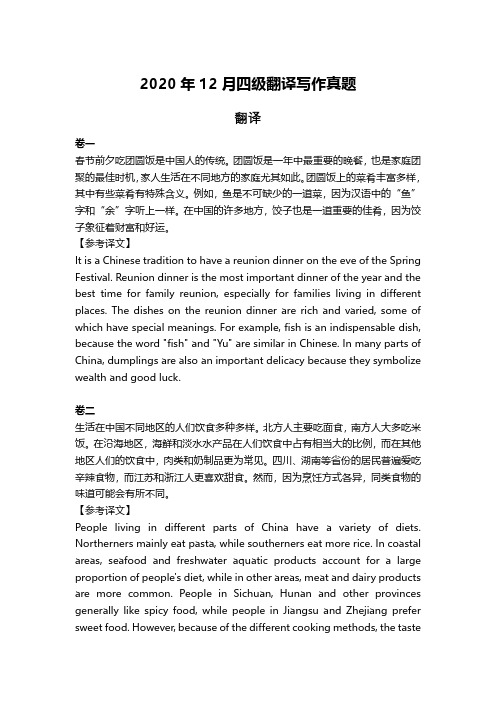
卷一: Directions: For this part, you are allowed 30 minutes to write a composition on the topic “ Changes in the way of Transportation” . You should write at least 120 words but no more than 180 words.
卷三 For this part, you are allowed 30 on the topic “ Changes in the way of Education” . You should write at least 120 words but no more than 180 words.
2020 年 12 月四级翻译写作真题
翻译
卷一 春节前夕吃团圆饭是中国人的传统。团圆饭是一年中最重要的晚餐,也是家庭团 聚的最佳时机,家人生活在不同地方的家庭尤其如此。团圆饭上的菜肴丰富多样, 其中有些菜肴有特殊含义。例如,鱼是不可缺少的一道菜,因为汉语中的“鱼” 字和“余”字听上一样。在中国的许多地方,饺子也是一道重要的佳肴,因为饺 子象征着财富和好运。 【参考译文】 It is a Chinese tradition to have a reunion dinner on the eve of the Spring Festival. Reunion dinner is the most important dinner of the year and the best time for family reunion, especially for families living in different places. The dishes on the reunion dinner are rich and varied, some of which have special meanings. For example, fish is an indispensable dish, because the word "fish" and "Yu" are similar in Chinese. In many parts of China, dumplings are also an important delicacy because they symbolize wealth and good luck.
2020年大学英语四级考试翻译试题及答案(全15篇)
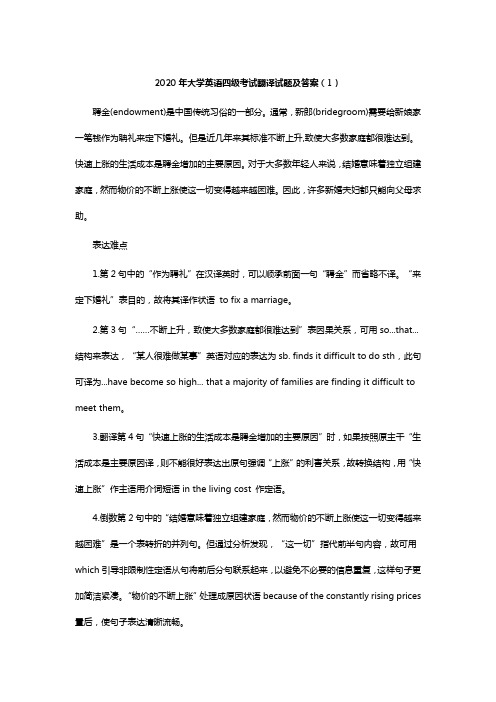
2020年大学英语四级考试翻译试题及答案(1)聘金(endowment)是中国传统习俗的一部分。
通常,新郎(bridegroom)需要给新娘家一笔钱作为聃礼来定下婚礼。
但是近几年来其标准不断上升,致使大多数家庭都很难达到。
快速上涨的生活成本是聘金增加的主要原因。
对于大多数年轻人来说,结婚意味着独立组建家庭,然而物价的不断上涨使这一切变得越来越困难。
因此,许多新婚夫妇都只能向父母求助。
表达难点1.第2句中的“作为聘礼”在汉译英时,可以顺承前面一句“聘金”而省略不译。
“来定下婚礼”表目的,故将其译作状语to fix a marriage。
2.第3句“……不断上升,致使大多数家庭都很难达到”表因果关系,可用so...that...结构来表达,“某人很难做某事”英语对应的表达为sb. finds it difficult to do sth,此句可译为...have become so high... that a majority of families are finding it difficult to meet them。
3.翻译第4句“快速上涨的生活成本是聘金增加的主要原因”时,如果按照原主干“生活成本是主要原因译,则不能很好表达出原句强调“上涨”的利害关系,故转换结构,用“快速上涨”作主语用介词短语in the living cost 作定语。
4.倒数第2句中的“结婚意味着独立组建家庭,然而物价的不断上涨使这一切变得越来越困难”是一个表转折的并列句。
但通过分析发现,“这一切”指代前半句内容,故可用which引导非限制性定语从句将前后分句联系起来,以避免不必要的信息重复,这样句子更加简洁紧凑。
“物价的不断上涨”处理成原因状语because of the constantly rising prices 置后,使句子表达清晰流畅。
参考译文Endowment is part of Chinese tradition. Usually, a bridegroom needs to pay a certain amount of money to the bride's family to fix a marriage. But the standards have become so high in recent years that a majority of families are finding it difficult to meet them. The rapid rise in the living cost is the main reason for the increase of endowment. For most young people, marriage means setting up a family independently, which has become increasingly difficult because of the constantly rising prices. Consequently, many newly married couples turn to their parents for help.2020年大学英语四级考试翻译试题及答案(2)中国结(Chinese knot)是中国文化的典型代表之一。
2020年12月四级翻译真题及答案
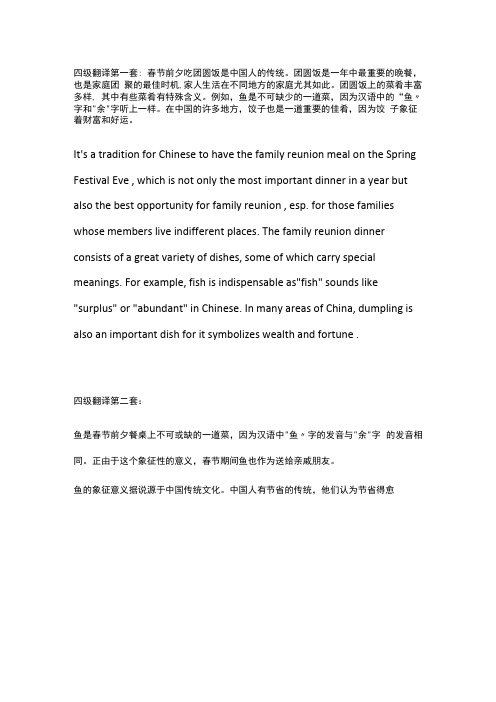
四级翻译第一套: 春节前夕吃团圆饭是中国人的传统。
团圆饭是一年中最重要的晚餐,也是家庭团聚的最佳时机,家人生活在不同地方的家庭尤其如此。
团圆饭上的菜肴丰富多样, 其中有些菜肴有特殊含义。
例如,鱼是不可缺少的一道菜,因为汉语中的“鱼〃字和"余"字听上一样。
在中国的许多地方,饺子也是一道重要的佳肴,因为饺子象征着财富和好运。
It's a tradition for Chinese to have the family reunion meal on the Spring Festival Eve , which is not only the most important dinner in a year but also the best opportunity for family reunion , esp. for those families whose members live indifferent places. The family reunion dinner consists of a great variety of dishes, some of which carry special meanings. For example, fish is indispensable as"fish" sounds like "surplus" or "abundant" in Chinese. In many areas of China, dumpling is also an important dish for it symbolizes wealth and fortune .四级翻译第二套:鱼是春节前夕餐桌上不可或缺的一道菜,因为汉语中"鱼〃字的发音与"余"字的发音相同。
2020年12月四级考试翻译真题及译文(网友版)

2020年12月四级考试翻译真题及译文(网友版)翻译原文:云南省的丽江古镇是中国的旅游目的地之一。
那里的生活节奏比绝大部分中国的城市都要缓慢。
丽江到处都是美丽的自然风光,众多的少数民族同胞提供了各式各样,丰富多彩的文化让游客体验。
历,丽江还以“爱之城”而闻名。
当地人中流传着很多关于人生,为爱而死的故事。
如今,在中外游客眼中,这个古镇被视为爱情和浪漫的天堂。
(paradise)翻译范文:Lijiang ancient town of Yunnan Provinceis one of the most famous travel attractions in China. The tempo of life thereis slower than that of most Chinese cities. There are many natural beauties everywhere and many national minorities provide tourists with variety of colorful cultural experience. It is also well-known as “the city of love” in history.Many stories about life and dying for love has received wide attention among the natives. Nowadays, tourists from both home and abroad treat this ancient city as a paradise of love and romance.翻译原文:今年在长沙举行了一年一度的外国人汉语演讲比赛。
这项比赛证明是促动中国和世界其他地区文化交流的好方法。
它为世界各地的年轻人提供了更好地了解中国的机会。
英语四级段落翻译练习(一)
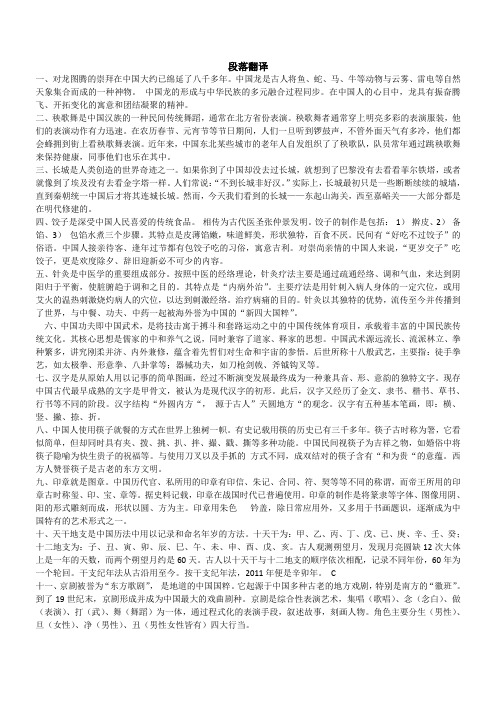
段落翻译一、对龙图腾的崇拜在中国大约已绵延了八千多年。
中国龙是古人将鱼、蛇、马、牛等动物与云雾、雷电等自然天象集合而成的一种神物。
中国龙的形成与中华民族的多元融合过程同步。
在中国人的心目中,龙具有振奋腾飞、开拓变化的寓意和团结凝聚的精神。
二、秧歌舞是中国汉族的一种民间传统舞蹈,通常在北方省份表演。
秧歌舞者通常穿上明亮多彩的表演服装,他们的表演动作有力迅速。
在农历春节、元宵节等节日期间,人们一旦听到锣鼓声,不管外面天气有多冷,他们都会蜂拥到街上看秧歌舞表演。
近年来,中国东北某些城市的老年人自发组织了了秧歌队,队员常年通过跳秧歌舞来保持健康,同事他们也乐在其中。
三、长城是人类创造的世界奇迹之一。
如果你到了中国却没去过长城,就想到了巴黎没有去看看菲尔铁塔,或者就像到了埃及没有去看金字塔一样。
人们常说:“不到长城非好汉。
”实际上,长城最初只是一些断断续续的城墙,直到秦朝统一中国后才将其连城长城。
然而,今天我们看到的长城——东起山海关,西至嘉峪关——大部分都是在明代修建的。
四、饺子是深受中国人民喜爱的传统食品。
相传为古代医圣张仲景发明。
饺子的制作是包括:1)擀皮、2)备馅、3)包馅水煮三个步骤。
其特点是皮薄馅嫩,味道鲜美,形状独特,百食不厌。
民间有“好吃不过饺子”的俗语。
中国人接亲待客、逢年过节都有包饺子吃的习俗,寓意吉利。
对崇尚亲情的中国人来说,“更岁交子”吃饺子,更是欢度除夕、辞旧迎新必不可少的内容。
五、针灸是中医学的重要组成部分。
按照中医的经络理论,针灸疗法主要是通过疏通经络、调和气血,来达到阴阳归于平衡,使脏腑趋于调和之目的。
其特点是“内病外治”。
主要疗法是用针刺入病人身体的一定穴位,或用艾火的温热刺激烧灼病人的穴位,以达到刺激经络。
治疗病痛的目的。
针灸以其独特的优势,流传至今并传播到了世界,与中餐、功夫、中药一起被海外誉为中国的“新四大国粹”。
六、中国功夫即中国武术,是将技击寓于搏斗和套路运动之中的中国传统体育项目,承载着丰富的中国民族传统文化。
2020年12月英语四级考试翻译真题解析

2020年12月英语四级考试翻译真题解析今年在长沙举办了一年一度的外国人汉语演讲比赛。
这项比赛证明是促动中国和世界其他地区文化交流的好方法。
它为世界各地的年轻人提供了更好地了解中国的机会。
来自87个国家共计126位选手聚集在湖南省省会参加了从7月6日到8月5日实行的半决赛和决赛。
比赛并不是的活动。
选手们还有机会参观了中国其他地区的景点和历史名胜。
解析:[今年][在长沙]举办了(一年一度的)[外国人]汉语演讲比赛。
此句和上篇考点类似,难点在于句子主干的寻找,“演讲比赛”和“举办”应转化为被动关系,此外,“了”字表明活动业已完成,处理为完成时。
The annual Mandarin Speech Contest for Foreigners has been held in Changsha this year.这项比赛证明是(促动中国和世界其他地区文化交流的)好方法。
This contest proves to be a good way to promote the cultural communication between China and other regions of the world.它[为世界各地的年轻人]提供了[更好地了解中国的]机会。
It provides the youths all over the world with an opportunity to know China better.另外,我们发现,前三句话主语一致,基础较好的同学可考虑将三句话合并在一起:The annual Mandarin Speech Contest has been held in Changsha this year, which proves to be ... and which provides ....来自87个国家共计126位选手聚集在湖南省省会参加了从7月6日到8月5日实行的半决赛和决赛。
2020年12月四级翻译真题及答案
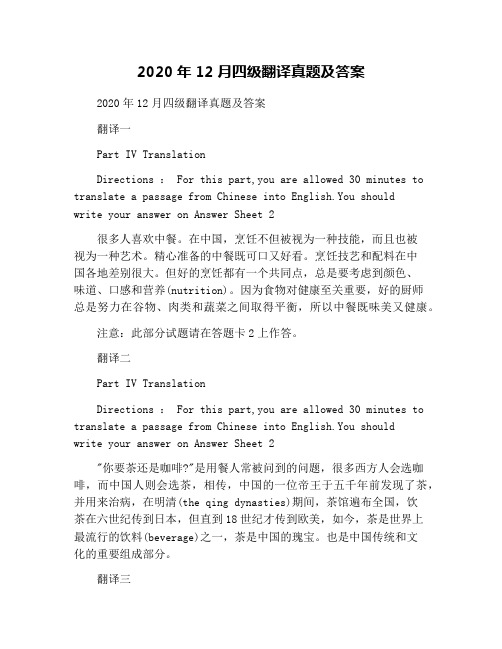
2020年12月四级翻译真题及答案2020年12月四级翻译真题及答案翻译一Part IV TranslationDirections : For this part,you are allowed 30 minutes to translate a passage from Chinese into English.You shouldwrite your answer on Answer Sheet 2很多人喜欢中餐。
在中国,烹饪不但被视为一种技能,而且也被视为一种艺术。
精心准备的中餐既可口又好看。
烹饪技艺和配料在中国各地差别很大。
但好的烹饪都有一个共同点,总是要考虑到颜色、味道、口感和营养(nutrition)。
因为食物对健康至关重要,好的厨师总是努力在谷物、肉类和蔬菜之间取得平衡,所以中餐既味美又健康。
注意:此部分试题请在答题卡2上作答。
翻译二Part IV TranslationDirections : For this part,you are allowed 30 minutes to translate a passage from Chinese into English.You shouldwrite your answer on Answer Sheet 2"你要茶还是咖啡?"是用餐人常被问到的问题,很多西方人会选咖啡,而中国人则会选茶,相传,中国的一位帝王于五千年前发现了茶,并用来治病,在明清(the qing dynasties)期间,茶馆遍布全国,饮茶在六世纪传到日本,但直到18世纪才传到欧美,如今,茶是世界上最流行的饮料(beverage)之一,茶是中国的瑰宝。
也是中国传统和文化的重要组成部分。
翻译三Part IV TranslationDirections : For this part,you are allowed 30 minutes to translate a passage from Chinese into English.You shouldwrite your answer on Answer Sheet 2中国结最初是由手工艺人发明的,经过数百年持续的改进,已经成为一种优雅多彩的艺术和工艺。
2020年12月英语四级翻译真题:汉语演讲比赛(版本一)
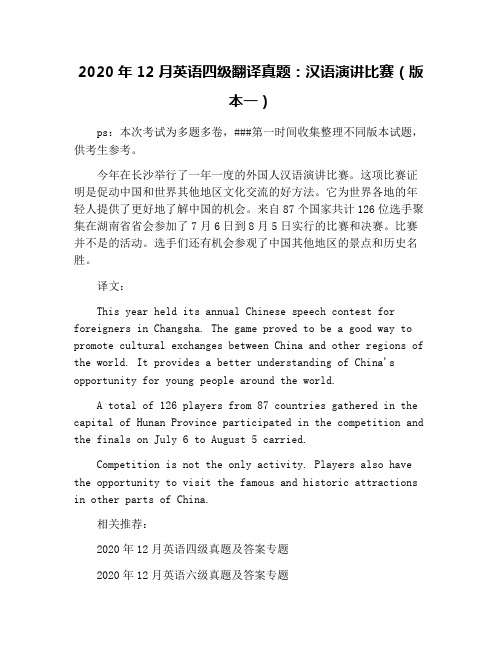
2020年12月英语四级翻译真题:汉语演讲比赛(版本一)ps:本次考试为多题多卷,###第一时间收集整理不同版本试题,供考生参考。
今年在长沙举行了一年一度的外国人汉语演讲比赛。
这项比赛证明是促动中国和世界其他地区文化交流的好方法。
它为世界各地的年轻人提供了更好地了解中国的机会。
来自87个国家共计126位选手聚集在湖南省省会参加了7月6日到8月5日实行的比赛和决赛。
比赛并不是的活动。
选手们还有机会参观了中国其他地区的景点和历史名胜。
译文:This year held its annual Chinese speech contest for foreigners in Changsha. The game proved to be a good way to promote cultural exchanges between China and other regions of the world. It provides a better understanding of China's opportunity for young people around the world.A total of 126 players from 87 countries gathered in the capital of Hunan Province participated in the competition and the finals on July 6 to August 5 carried.Competition is not the only activity. Players also have the opportunity to visit the famous and historic attractions in other parts of China.相关推荐:2020年12月英语四级真题及答案专题2020年12月英语六级真题及答案专题2020年12月英语四级成绩查询专题2020年12月英语六级成绩查询专题。
2020年12月英语四级考试真题含答案
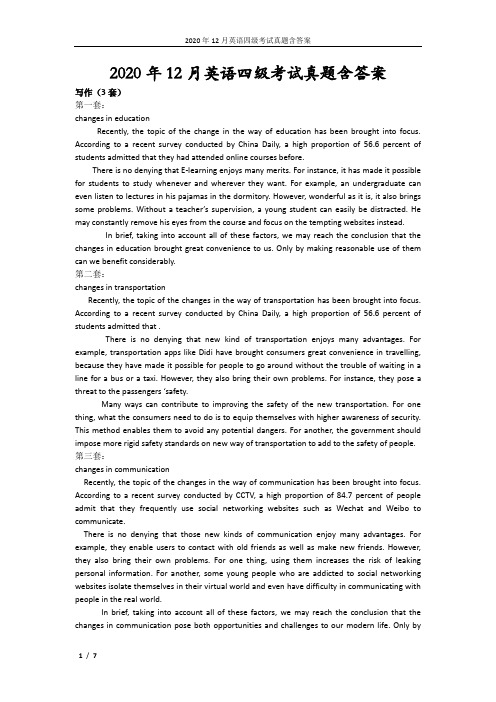
2020年12月英语四级考试真题含答案写作(3套)第一套:changes in educationRecently, the topic of the change in the way of education has been brought into focus. According to a recent survey conducted by China Daily, a high proportion of 56.6 percent of students admitted that they had attended online courses before.There is no denying that E-learning enjoys many merits. For instance, it has made it possible for students to study whenever and wherever they want. For example, an undergraduate can even listen to lectures in his pajamas in the dormitory. However, wonderful as it is, it also brings some problems. Without a teacher’s supervision, a young student can easily be distracted. He may constantly remove his eyes from the course and focus on the tempting websites instead.In brief, taking into account all of these factors, we may reach the conclusion that the changes in education brought great convenience to us. Only by making reasonable use of them can we benefit considerably.第二套:changes in transportationRecently, the topic of the changes in the way of transportation has been brought into focus. According to a recent survey conducted by China Daily, a high proportion of 56.6 percent of students admitted that .There is no denying that new kind of transportation enjoys many advantages. For example, transportation apps like Didi have brought consumers great convenience in travelling, because they have made it possible for people to go around without the trouble of waiting in a line for a bus or a taxi. However, they also bring their own problems. For instance, they pose a threat to the passengers ‘safety.Many ways can contribute to improving the safety of the new transportation. For one thing, what the consumers need to do is to equip themselves with higher awareness of security. This method enables them to avoid any potential dangers. For another, the government should impose more rigid safety standards on new way of transportation to add to the safety of people. 第三套:changes in communicationRecently, the topic of the changes in the way of communication has been brought into focus. According to a recent survey conducted by CCTV, a high proportion of 84.7 percent of people admit that they frequently use social networking websites such as Wechat and Weibo to communicate.There is no denying that those new kinds of communication enjoy many advantages. For example, they enable users to contact with old friends as well as make new friends. However, they also bring their own problems. For one thing, using them increases the risk of leaking personal information. For another, some young people who are addicted to social networking websites isolate themselves in their virtual world and even have difficulty in communicating with people in the real world.In brief, taking into account all of these factors, we may reach the conclusion that the changes in communication pose both opportunities and challenges to our modern life. Only bymaking reasonable use of them can we benefit considerably.听力(2套)第一套:1. D) A deadly fish has been spotted in the Mediterranean waters.2. B) It could pose a threat to other marine species.3. C) About half of its city center will be closed to cars .4. D) The rising air pollution in Paris .5. A) His house was burnt down in a fire.6. C) Sell the pearl he had kept for years.7. B) His monstrous pearl was extremely valuable.8. A) It boasts a fairly long history.9. D) It is a family business.10. B) Loss the competitive edge.11. D) Conducting a financial analysis for it.12. B) She is really impressed by the man’s house.13. C) From home design magazines.14. A)The cost was affordable.15. D) She wants him to share his renovation experience with her.16. C) Removing objects from patients' noses and ears.17. B) Five- to nine-year-olds are the most likely to put things in their ears.18. D) They are curious about these body parts.19. A) It gave her a used bicycle.20. A) Expanding bike-riding lessons.21. D) It is a charity organization.22. A) How animals deal with lack of gravity.23. C) They were not used to the low-gravity environment.24. B) They already felt at home in the new environment.25. C) They behaved as if they were on Earth.第二套:1. D) He did an unusual good deed.2. C) Give some money to the waiter.3. A) Whether or not to move to the state's mainland.4. B) It costs too much money.5. A) To investigate whether people are grateful for help.6. C) They held doors open for people at various places.7. B) Most people express gratitude for help.8. C) To enquire about solar panel installations.9. D) He has a large family.10. B) The cost of a solar panel installation.11. D) About five years.12. A)At a travel agency.13. D)She wanted to spend more time with her family .14. D) Two weeks .15. A) Choosing some activities herself16. D) Pay a green tax upon arrival.17. A) It has not been doing a good job in recycling.18.B) To ban single-use plastic bags and straws on bali island.19. D) Its population is now showing signs of increase.20. C) Commercial hunting.21. D) To seek breeding grounds.22. C) They consume less milk these days.23. A) It is not as healthy as once thought.24. C) They lack the necessary proteins to digest it.25. B) It provides some necessary nutrients.阅读(3套)第一套:选词填空Trust is fundamental to life...26-30 CMGAO 31-35 JKFIH26. C) essential27. M) suspicion28. G) miserable29. A) constantly30. O) watching31. J) records32. K) removed33. F) load34. I) properly35. H) pressure长篇阅读The Place Where the Poor Once Thrived36-40 HDKEG 41-45 IECHF36. According to some people living in San Jose, it has become much harder for the poor to get ahead due to the increased inequality.H定位句:Some San Jose residents gay that as inequality has grown in recent years, upward mobility has become much more difficult to achieve.37. In American history, immigrants used to have a good chance to move upward in society.D定位句:This is a city of immigrants——38 percent of the city's population today is foreign-born ——and immigrants and their children have historically experienced significant upward mobility in America.38. If the problems of San Jose can't be solved, one of America's fundamental beliefs about itself can be shaken.K定位句:The idea that those at the bottom can rise to the top is central to America's ideas about itself. That such mobility has become more difficult in San Jose raises questions about the endurance of that foundational belief.39. San Jose was among the best cities in America for poor kids to move up the social ladder.E定位句:San Jose had social mobility comparable to Denmark's and Canada's and higher than other progressive cities such as Boston and Minneapolis.40. Whether poor kids in San Jose today still have the chance to move upward is questionable.G定位句:Whether the city still allows for upward mobility of poor kids today, though, is up for debate.41. San Jose's officials are resolved to give poor kids access to the resources necessary for success in life.I定位句:Leaders in San Jose are determined to make sure that the city regains its status as a place where even poor kids can access the resources to succeed.42. San Jose appears to manifest some of the best features of America.E定位句:Indeed, the streets of San Jose seem, in some ways, to embody the best of America. 43. As far as social mobility is concerned, San Jose beat many other progressive cities in America. C定位句:San Jose had social mobility comparable to Denmark's and Canada's and higher than other progressive cities such as Boston and Minneapolis.44. Due to some changes like increases in housing prices in San Jose, the prospects for its poor people have dimmed.H定位句:Given this, the future for the region's poor doesn't look nearly as bright as it once did. 45. Researchers do not have a clear idea why poor children in San Jose achieved such great success several decades ago.F定位句:But researchers aren't sure exactly why poor kids in San Jowe did so well.仔细阅读Passage One—Three children in every classroom have a diagnosable mental health conditions.46-50 DABCD46. What are teachers complaining about?D) They lack the necessary resources to address pupils’ mental problems.47. What do we learn from the passage about community health services in Britain?A) They have deteriorated due to budget cuts.48. Where does the author suggest mental health services be placed?B) At school.49. What do we learn from the recent studies?C) Students are more comfortable seeking counseling in school.50. What does the author mean by a cultural shift (Line 2-3, Para. 6)?D) A change in the conception of what schools are?Passage Two—Picture this: You’re at a movie theater food stand...51-55 ADBCB51. Why does the author ask us to imagine buying food in the movie theater?A) To illustrate people’s peculiar shopping behavior.52. Why is the medium soda priced the way it is?D) To make customers believe they are getting a bargain.53. What do we learn from Dan Ariely’s experiment?B) The Economist’s promotional strategy works.54. For what purpose is “the bad option” (Line 7, Para. 3) added?C) To trap customers into buying the more pricey item.55. How do we assess the value of a commodity, according to the passage?B) By comparing it with other choices.第二套:选词填空开头:When my son completes a task, I can't help but praise him...26-30 BGKLC 31-35 HIDNO26. B) constant27. G) negative28. K) repeatedly29. L) rewarded30. C) disappointing31. H) outcome32. I) pattern33. D) distinguish34. N) simply35. O) undertaken长篇阅读开头:Poverty is a story about us, not them36-40 EHMJD 41-45 FNICL36. One legislative staffer assumed that a woman of color who advocated affordable childcare must be a single mother.答案:E)That moment, says Mothering Justice director Danielle Atkinson ...37. People from different races, genders, and regions all suffer...答案:H) But the fact that 4 in 10 Americans can’t come up38. According to a survey, while the majority believe...答案:M) According to the General Social Survey...39. A research group has found that Americans ...答案:J) The FrameWorks Institute, a research group...40. Under the old system in America, a mother was ...答案:D) If these are the central characters of our story41. It was found that nearly 50% of Americans are poor or receive low pay...答案:F) How many of us are poor in the U.S.?42. Americans usually overestimate the number of blacks receiving welfare benefit.答案:N) “Poverty has been interchangeable with people of color...43. It is impossible for Americans to lift themselves out of poverty entirely on their own.答案:I) Negative images remain of who is living in poverty ...44. Nowadays, it seems none of us can get away from income inequality.答案:C) Today’s faces of income inequality and lack of opportunity ...45. Assumptions about poor people become even more negative when they live on welfare.答案:L) Those external factors include the difficulties ...仔细阅读Passage One—Boredom has, paradoxically, become quite interesting to academics lately. 46-50 ADBCD46. A)When they don’t have the chance to do what they want.47. D) Harmful conduct.48. B) Many volunteers choose to hurt themselves rather than endure boredom.49. C) It may promote creative thinking.50. D) Allow oneself some time to be bored.Passage Two—Forests in countries like Brazil and the Congo get a lot of attention51-55 BCACD51. B) Forests are fast shrinking in many developing countries.52. C) Those that used to have the lowest forest coverage.53. A) The government’s advocacy.54. C) Their capability of improving air quality.55.D) Developed and developing countries are moving in opposite directions.第三套:选词填空开头:The things people make, and the way...26-30 KGMLO 31-35 FHADN26. K) matters27. G) flexible28. M) promised29. L) moving30. O) spared31. F) feature32. H) inevitably33. A) automation34. D) fantastic35. N) shape长篇阅读The history of the Lunch Box36-40 FJOCH41-45 LDAMI仔细阅读Passage One开头:A growing number of U.S. bike riders...46-50 CBDAD46. C) They did not become popular until the emergence of improved batteries.47. B) The falling prices of e-bike batteries.48. D) It will make a difference in people’s daily lives.49. A) Retailers’ refusal to deal in e-bikes.50. D) The younger generation’s pursuit of comfortable riding.Passage Two开头:The terms “global warming”and "climate change"...51-55 ACDBC51. A) To sway public opinion of the impact of human activities on Earth.52. C) it covers more phenomena53. D) Deliberate choice of words.54. B) For greater precision.55. C) Human activities have serious effects on Earth.翻译(3套)第一套:生活在中国不同地区的人们饮食多种多样。
2020年12月四级翻译真题及答案

2020年12月四级翻译真题及答案2020年12月四级翻译真题及答案翻译一Part IV TranslationDirections : For this part,you are allowed 30 minutes to translate a passage from Chinese into English.You shouldwrite your answer on Answer Sheet 2很多人喜欢中餐。
在中国,烹饪不但被视为一种技能,而且也被视为一种艺术。
精心准备的中餐既可口又好看。
烹饪技艺和配料在中国各地差别很大。
但好的烹饪都有一个共同点,总是要考虑到颜色、味道、口感和营养(nutrition)。
因为食物对健康至关重要,好的厨师总是努力在谷物、肉类和蔬菜之间取得平衡,所以中餐既味美又健康。
注意:此部分试题请在答题卡2上作答。
翻译二Part IV TranslationDirections : For this part,you are allowed 30 minutes to translate a passage from Chinese into English.You shouldwrite your answer on Answer Sheet 2"你要茶还是咖啡?"是用餐人常被问到的问题,很多西方人会选咖啡,而中国人则会选茶,相传,中国的一位帝王于五千年前发现了茶,并用来治病,在明清(the qing dynasties)期间,茶馆遍布全国,饮茶在六世纪传到日本,但直到18世纪才传到欧美,如今,茶是世界上最流行的饮料(beverage)之一,茶是中国的瑰宝。
也是中国传统和文化的重要组成部分。
翻译三Part IV TranslationDirections : For this part,you are allowed 30 minutes to translate a passage from Chinese into English.You shouldwrite your answer on Answer Sheet 2中国结最初是由手工艺人发明的,经过数百年持续的改进,已经成为一种优雅多彩的艺术和工艺。
2020年12月英语四级真题及参考答案-三套全
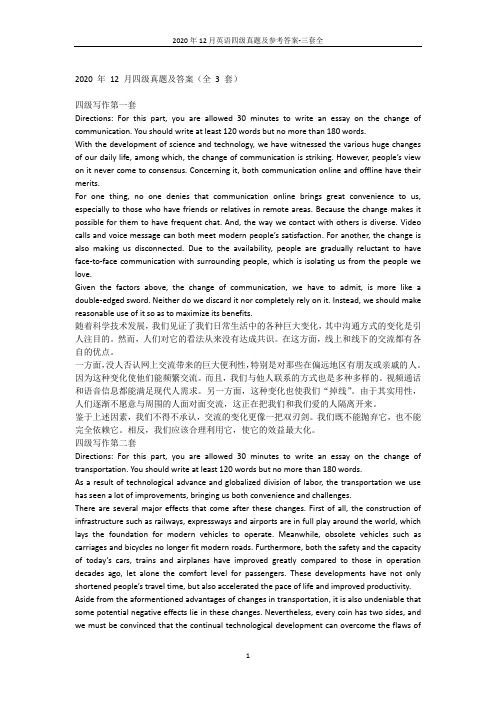
2020 年12 月四级真题及答案(全3 套)四级写作第一套Directions: For this part, you are allowed 30 minutes to write an essay on the change of communication. You should write at least 120 words but no more than 180 words.With the development of science and technology, we have witnessed the various huge changes of our daily life, among which, the change of communication is striking. However, people’s view on it never come to consensus. Concerning it, both communication online and offline have their merits.For one thing, no one denies that communication online brings great convenience to us, especially to those who have friends or relatives in remote areas. Because the change makes it possible for them to have frequent chat. And, the way we contact with others is diverse. Video calls and voice message can both meet modern people’s satisfaction. For another, the change is also making us disconnected. Due to the availability, people are gradually reluctant to have face-to-face communication with surrounding people, which is isolating us from the people we love.Given the factors above, the change of communication, we have to admit, is more like a double-edged sword. Neither do we discard it nor completely rely on it. Instead, we should make reasonable use of it so as to maximize its benefits.随着科学技术发展,我们见证了我们日常生活中的各种巨大变化,其中沟通方式的变化是引人注目的。
2020年12月四六级翻译押题
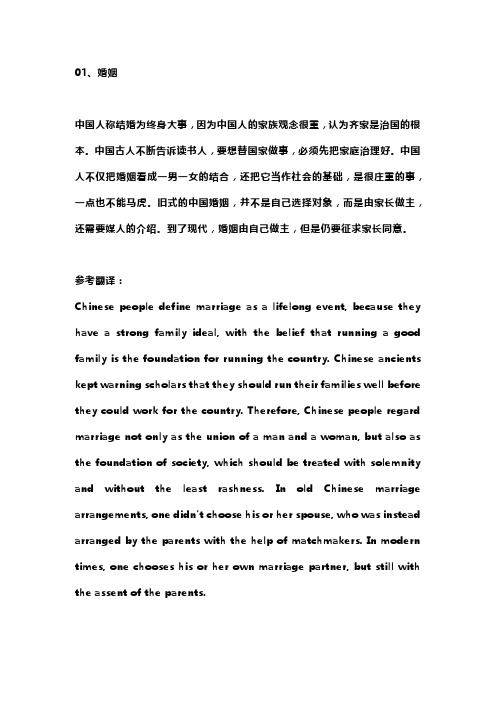
中国人称结婚为终身大事,因为中国人的家族观念很重,认为齐家是治国的根本。
中国古人不断告诉读书人,要想替国家做事,必须先把家庭治理好。
中国人不仅把婚姻看成一男一女的结合,还把它当作社会的基础,是很庄重的事,一点也不能马虎。
旧式的中国婚姻,并不是自己选择对象,而是由家长做主,还需要媒人的介绍。
到了现代,婚姻由自己做主,但是仍要征求家长同意。
参考翻译:Chinese people define marriage as a lifelong event, because they have a strong family ideal, with the belief that running a good family is the foundation for running the country. Chinese ancients kept warning scholars that they should run their families well before they could work for the country. Therefore, Chinese people regard marriage not only as the union of a man and a woman, but also as the foundation of society, which should be treated with solemnity and without the least rashness. In old Chinese marriage arrangements, one didn't choose his or her spouse, who was instead arranged by the parents with the help of matchmakers. In modern times, one chooses his or her own marriage partner, but still with the assent of the parents.中医(Traditional Chinese Medicine )有五千多年的历史,是中国古代劳动人民几千年来对抗疾病的经验总结。
2020年12月大学英语四级考试真题及详解(第三套)
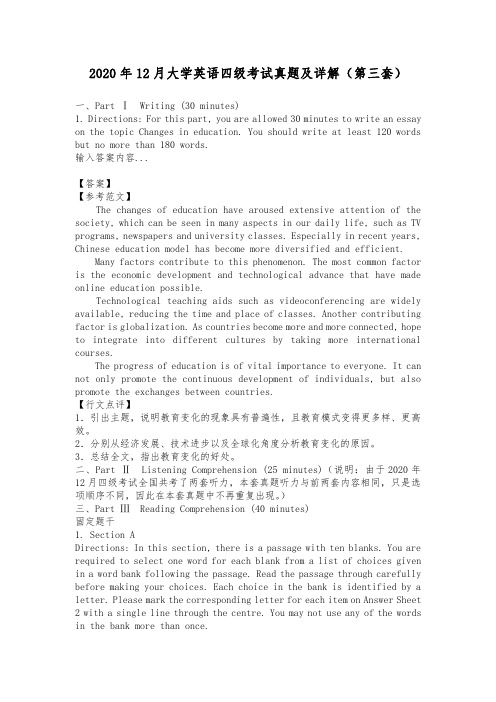
2020年12月大学英语四级考试真题及详解(第三套)一、PartⅠWriting(30minutes)1.Directions:For this part,you are allowed30minutes to write an essay on the topic Changes in education.You should write at least120words but no more than180words.输入答案内容...【答案】【参考范文】The changes of education have aroused extensive attention of the society,which can be seen in many aspects in our daily life,such as TV programs,newspapers and university classes.Especially in recent years, Chinese education model has become more diversified and efficient.Many factors contribute to this phenomenon.The most common factor is the economic development and technological advance that have made online education possible.Technological teaching aids such as videoconferencing are widely available,reducing the time and place of classes.Another contributing factor is globalization.As countries become more and more connected,hope to integrate into different cultures by taking more international courses.The progress of education is of vital importance to everyone.It can not only promote the continuous development of individuals,but also promote the exchanges between countries.【行文点评】1.引出主题,说明教育变化的现象具有普遍性,且教育模式变得更多样、更高效。
2020年12月英语四级翻译答案解析:望子成龙
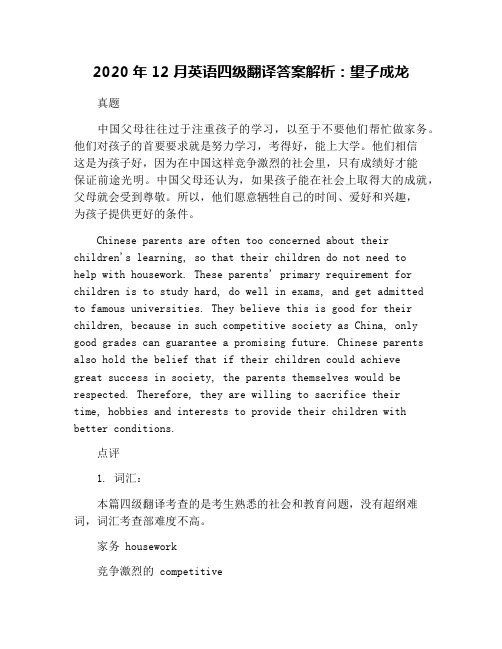
2020年12月英语四级翻译答案解析:望子成龙真题中国父母往往过于注重孩子的学习,以至于不要他们帮忙做家务。
他们对孩子的首要要求就是努力学习,考得好,能上大学。
他们相信这是为孩子好,因为在中国这样竞争激烈的社会里,只有成绩好才能保证前途光明。
中国父母还认为,如果孩子能在社会上取得大的成就,父母就会受到尊敬。
所以,他们愿意牺牲自己的时间、爱好和兴趣,为孩子提供更好的条件。
Chinese parents are often too concerned about their children's learning, so that their children do not need tohelp with housework. These parents' primary requirement for children is to study hard, do well in exams, and get admitted to famous universities. They believe this is good for their children, because in such competitive society as China, only good grades can guarantee a promising future. Chinese parents also hold the belief that if their children could achievegreat success in society, the parents themselves would be respected. Therefore, they are willing to sacrifice their time, hobbies and interests to provide their children with better conditions.点评1. 词汇:本篇四级翻译考查的是考生熟悉的社会和教育问题,没有超纲难词,词汇考查部难度不高。
- 1、下载文档前请自行甄别文档内容的完整性,平台不提供额外的编辑、内容补充、找答案等附加服务。
- 2、"仅部分预览"的文档,不可在线预览部分如存在完整性等问题,可反馈申请退款(可完整预览的文档不适用该条件!)。
- 3、如文档侵犯您的权益,请联系客服反馈,我们会尽快为您处理(人工客服工作时间:9:00-18:30)。
2020年12月英语四级翻译练习题及解析:中国成语
中国成语是汉语中意义完整的表示一般概念的固定词组或短语。
“成语”中的“成”既是约定俗成。
成语是比词大而语法功能又相当
于词的语言单位。
绝绝大部分的中国成语由四个汉字组成,例如:自
强不息、青出于蓝、厚积薄发。
成语主要从民间谚语、古代文学作品、诗歌、寓言、典故、名言警句等方面提炼而成,是汉语语言中精炼而
又富有生命力的一部分。
Chinese idioms refer to comprehensive and integrated
fixed phrases and expressions. Idioms are established and accepted by constant usage and common practice. An idiom is a language unit that is larger than a word, but has the same grammatical function as a word. Most Chinese idioms consist
of four characters. For example, ziqiangbuxi ( make
unremitting efforts to improve oneself), qingchuyulan(bluer than indigo), and houjibofa (success comes with time and effort). Idioms are extrated from folk proverbs, ancient
works of literature, poems, fables, allusions, and well-known sayings. Idioms are a part of the Chinese language that are concise and have great vitality.。
